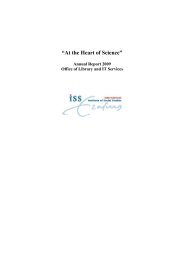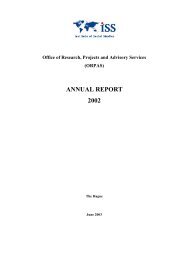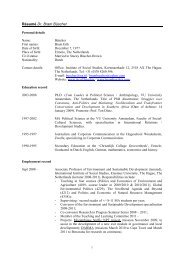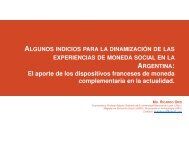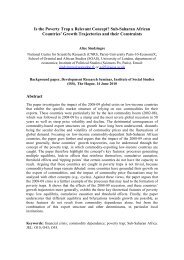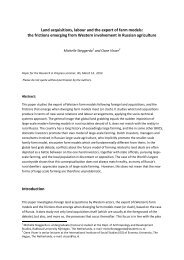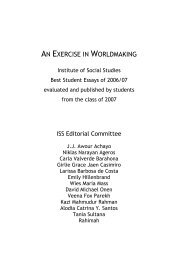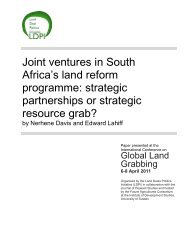AN EXERCISE IN WORLDMAKING 2009 - ISS
AN EXERCISE IN WORLDMAKING 2009 - ISS
AN EXERCISE IN WORLDMAKING 2009 - ISS
You also want an ePaper? Increase the reach of your titles
YUMPU automatically turns print PDFs into web optimized ePapers that Google loves.
90 MEKALIA PAULOS AKLILU<br />
best and sheer insanity at worst. However, to the extent that it attains a certain<br />
implicit objective, the aforementioned concept is pivotal in benevolently shrouding this<br />
underlying motive.<br />
The history of developed nations irrevocably attests to the fact that<br />
they did not achieve such heights in the manner they faithfully prescribe<br />
to their ill-fated counterparts, a strategy of “kicking away the ladder” as<br />
Chang so poignantly epitomizes (Chang 2002). The rich Western nations<br />
seem to have fashioned “a multilateral order which best suits their current<br />
developmental trajectory – one that diminishes space for promoting<br />
industries critical to [other nations’] climb up the development ladder”<br />
(Weiss 2005: 723). Particularly telling is the fact that South Korea had no<br />
necessity for further capital owing to its phenomenal savings rate, thus<br />
this begs the question why it was pressured by external forces to follow<br />
such a course of action. The accumulation of immense sums of wealth in<br />
the realm of global financiers, a substantial percentage of which resulted<br />
from speculative transactions, would be one indubitable drive.<br />
That there is an enduring liaison between individuals in the US Treasury,<br />
US Federal Reserve, IMF, World Bank and chief Wall Street financiers<br />
is a well-known but not overtly acknowledged phenomenon as influential<br />
forces continue to hold the IMF and World Bank captive to their<br />
agendas (Chossudovsky 2003). With a “one dollar, one vote” rule, the<br />
US has a major say in world financial policies. It is thus prudent to view<br />
the response to the crisis in the larger framework of the crucial position<br />
ideas and ideology (premised on underlying interests) hold in formulating<br />
economic policies. As Beeson and Islam argue, “the contest of ideas in<br />
economic policy-making can evolve independently of their intellectual<br />
merit and empirical credibility” (Beeson and Islam 2005). The excessive<br />
sway the United States held over the IMF and World Bank policy making<br />
apparatus was reflected in the notion that the South Korean economy<br />
was essentially flawed and thus warranted fundamental reform.<br />
There was a severe dearth in a rational, impartial and dispassionate study<br />
in the origins of the crisis. Those that raised objections to the verdict<br />
were expediently discounted (but this begs the question if such institutions<br />
can ever truly be politically neutral as it can be argued legitimizing<br />
certain entrenched interests was the very reason for their inception in the<br />
global sphere). By Stiglitz’s own admission, viewing the IMF recommended<br />
reform process through the prism of accomplishing, first and<br />
foremost, the interests of the financial community would make sense of



